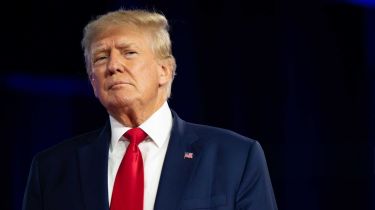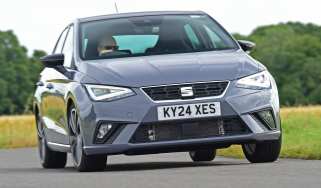Trump tariffs explained: how the US’ ‘Liberation Day’ will affect motorists
What are tariffs; how will they affect you; what is the UK Government doing about it? We answer your questions on the topic that’s shaken the car industry

He’s finally done it; President Donald Trump has long remarked that “tariffs” is his favourite word, threatening to impose them across the globe in order to turbocharge manufacturing and investment in the US itself.
Now, as part of what Trump has described as the nation’s ‘Liberation Day’, the US has inflicted unprecedented tariffs on imports from around the world (including the UK) in a move that will undoubtedly have a wide-reaching impact on both the automotive industry, as well as consumers.
To cut through the jargon and confusion, we’ve summarised your most burning questions below to explain how these tariffs, as distant and inconsequential to our daily lives as they may seem, will affect you.
What are tariffs and why has Trump imposed them?
In a nutshell, a tariff is a kind of taxation that’s imposed at a country’s border on the import and/or export of goods. Such tariffs are often used to discourage the use of foreign goods by raising prices, because most of the time, whatever is imposed, it is typically passed onto the consumer.
The reason behind Trump’s usage of tariffs is that he believes foreign nations have unfairly benefitted from low import duties into the US, with many smaller nations charging much higher tariffs on goods imported from America. The President has branded the situation an “atrocity”, stating that the imposition of new tariffs will “make America wealthy again”.
What tariffs are being imposed on the UK?
Under Trump’s new plans, products brought into the US from the UK are now subject to a 10 per cent import tariff. While this may sound extreme, it’s actually the ‘baseline’ of what the White House is now imposing and looks kind compared with the 20 per cent charged on EU products.
More important for this discussion, however, is the global 25 per cent tariff that has been imposed on automotive products (be that finished vehicles or parts) that are imported to the States. While this is separate to the above 10 per cent tariff, it’s undoubtedly a huge blow to the automotive sector across the globe.
Will Trump’s tariffs impact jobs?
One of the ‘get out of jail free’ clauses of Trump’s tariffs is that manufacturers can avoid them by shifting manufacturing to the US; previously, the President said, “If [cars are] made in the United States, there’s absolutely no tariff.”
Taking this into account, several manufacturers will likely be looking right now to shift production out of the UK to the US in order to dodge the additional duties. A good example of this, albeit from abroad, is Hyundai which, seeing that the writing was on the wall when it came to Trump imposing global tariffs, announced a $21 billion investment in the States, including building a new steel plant in Louisiana.

Currently, the UK’s largest automotive exporter to the US is JLR; the firm exported roughly 95,000 vehicles to North America in the 2023/24 financial year, with the majority of these going to the States. With JLR’s principal assembly plant currently based in Solihull, West Midlands, the firm might consider shifting production to the US.
The Institute for Public Policy Research (IPPR) estimates that Trump’s tariffs could result in as many as 25,000 job losses across the UK – a seismic impact for the UK economy, not to mention the individual. Auto Express asked both JLR and Bentley – two brands set to be hit significantly by these new tariffs – whether they plan to move production to the States, although neither refused to comment on future plans, nor rule out the above.
How will Trump tariffs impact car prices?
According to the chief executive of the UK’s Society of Motor Manufacturers and Traders, Mike Hawes, “tariff costs cannot be absorbed by manufacturers.” So with this in mind, consumers in the US can expect higher prices as a result.
Take the MINI Cooper, for example, which is currently built at the firm’s plant in Oxford. In the US, where the standard model isn’t offered, the Cooper S retails for around $32,000 (£24,400). If the full 25 per cent tariff is passed onto consumers then that could push up the cost to an eye-watering $40,000 (£30,500) before options.
On this side of the pond, however, experts believe there could be some small benefits amidst the chaos. Car finance firm Carmoola says that manufacturers could redirect models to the UK if sales in the US flatten, meaning there could be the potential for some discounts.
Carmoola’s CEO, Aidan Rushby, also suggested that a reduction in new-car prices could impact resale values – music to the ears of savvy used-car buyers. “That’s good news if you’re buying, but for current car owners, it could mean your vehicle loses value faster,” Rushby said.
On the other hand, manufacturers may also raise prices over here in the UK in order to offset the increased burden of exporting to the US. Regardless, it may be a while until we know what manufacturers are planning to do in this regard, because few are willing to offer knee-jerk reactions and/or comment at this stage.
What is the UK Government doing about it?
As soon as Donald Trump announced in March that he planned to hit foreign automotive manufacturers with tariffs, the UK Government quickly consulted the country’s car industry and began trade talks with the US.
However, business secretary Jonathan Reynolds was unable to find a solution in time, with the UK being hit by the 25 per cent automotive tariff, as well as the baseline 10 per cent tariff for all other goods.
Nevertheless, Prime Minister Keir Starmer has voiced his hopes that the UK can broker a deal, saying: “The President of the US acted for his country, and that is his mandate… I will act in Britain's interests with mine.”
This has been backed up by Reynolds, who told the House of Commons that the UK is in “the best position of any country” to have the US withdraw its tariff arrangement. Ultimately, the government will want to avoid an all-out trade war with the US, instead focusing on brokering a deal, rather than issuing retaliatory tariffs of its own.
What do you think about the new US import tariffs? Let us know your thoughts in the comments section...
Find a car with the experts





